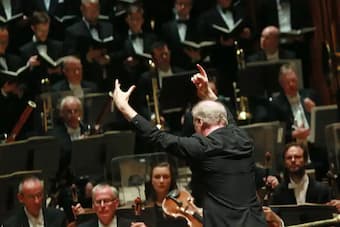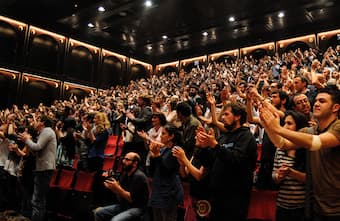If there is one art form that wears its passion on its sleeve, it is classical music.
Images of conductors in full flight have become the go-to photos and videos for people who are looking to express visually the passion in classical music. Some conductors look like they are in tears and some, actually are. Have a look at the enthusiasm of several conductor’s reactions to leading Gustav Mahler’s Symphony No. 2 ‘Resurrection’.
There is a reason for conductors to react the way they do. The time and effort that goes into creating a stage performance of any piece of music is monumental. I’ve sat through several rehearsals and I have never seen a conductor that just steps up to the podium and instructs without dialogue, discussion, interpretation and passion.

Gianandrea Noseda conducting the London Symphony Orchestra
© The Washington Post
I’ve seen conductors take sections and individuals aside and offer them help and advice on the part they play. In how many businesses do you get the boss taking the time to give a staff member individual input, guidance and encouragement? Not a lot.
Music is about passion. It is the sound of passion. We should all get more passionate about music. We did not design classical music to sit in the background like wallpaper or ambient lighting. Composers do not spend their lives pouring out music for it to become something that happens in the backdrop of a conversation. It takes musicians most of their lives to get to create professional music. They do it because they are passionate about expressing music so you can feel what they do.
Watch and listen to this piece from Schindler’s List by John Williams. It becomes too much for the Cor Anglais player as the sound and emotion overwhelm her. I’ll say it again, music is about passion.
I guess the standard view of people that regularly attend classical music concerts goes something like this; reserved, restrained, straight and non-emotional. For some, that outward appearance of these characteristics is correct, but underneath, underneath most are bubbling with excitement and enjoyment.

© medium.com
Of course, it’s not just classical music that stirs the passion in listeners and players alike. It’s the same for people who love Rock, Jazz, Country and every other form of music. But classical music has a more complex structure, and it is usually way longer than popular music, so there’s more to be involved with and passionate about.
I know that some pop songs move me as much as any classical pieces do, and maybe they stay with me longer. However, as classical music goes through more rhythmical changes, and it usually has greater highs and lows and has additional musical progressions over popular music, there’s more to find in classical music. So, for me, it creates a greater passion.
I can listen to classical music all day, every day. I can’t do that with jazz, rock, country or pop. Usually, because there are too many lyrics to hear and they compete with one another. Plus, many pop songs get stuck in my head and become earworms.
That said, pop has many benefits over classical music. Pop music sounds better in recordings. Live concerts are where classical music shines. The immediacy of pop music offers a quicker hit than classical music. It does not burden you through spending an extended amount of time having to listen to pop music. And, honestly, popular music has a greater universal appeal, hence its name.
The passion for classical music was and still is strong among many people and groups. However, in the place that seems to be generally accepted as a refined and congenial space, the concert hall can be a riot, literally. You will probably have heard of the “riot” that took place at the first performance of Stravinsky’s Rite of Spring in Paris in 1913. In this BBC film, Riot at the Rite, they dramatise that event well, albeit with strong British accents.
I have been to several concerts where audience members have booed and hissed, and in one, I remember the principal violinist who was so overtaken by the sound that she got up and danced a tango along with the music. While it was scripted, it still surprised and delighted the audience.
You can see and hear all sorts of things at classical music concerts. Have a look at this somersaulting soprano. And how about this quartet of whacky musicians?
However, the passion in classical music is mostly in the music itself. Classical music may be the best mood music there is. There are so many terms indicative of style for classical music, about 60, and that’s just the standard Italian terms like ‘Con forza’, with force. There are many more contemporary terms used for new classical music. These are required because passion changes and a greater and a more refined sense of expression is required today.
Classical music is about passion. It creates and expresses passion. My wish is that more people would listen to classical music. We could have a more passionate and caring society if greater numbers of people found the passion in classical music.
For more of the best in classical music, sign up to our E-Newsletter



